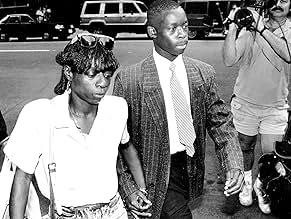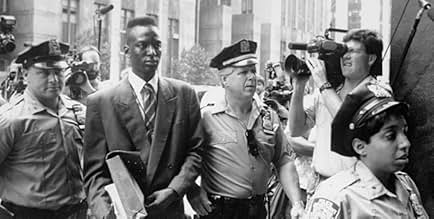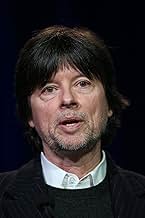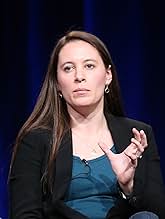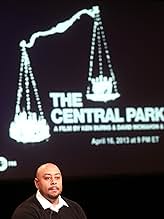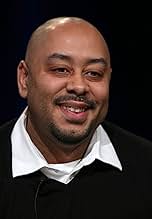CALIFICACIÓN DE IMDb
7.7/10
8.2 k
TU CALIFICACIÓN
Sobre el caso de 5 adolescentes de afroamericanos y latinos quienes pasaron entre 6 y 13 años en prisión por una violación que no cometieron.Sobre el caso de 5 adolescentes de afroamericanos y latinos quienes pasaron entre 6 y 13 años en prisión por una violación que no cometieron.Sobre el caso de 5 adolescentes de afroamericanos y latinos quienes pasaron entre 6 y 13 años en prisión por una violación que no cometieron.
- Dirección
- Guionistas
- Elenco
- Premios
- 10 premios ganados y 18 nominaciones en total
Kharey Wise
- Self - Wrongfully Convicted
- (as Korey Wise)
Matias Reyes
- Self - Confessed Rapist
- (material de archivo)
- (archivo de sonido)
Calvin O. Butts III
- Self - Reverend
- (as Rev. Calvin Butts)
- Dirección
- Guionistas
- Todo el elenco y el equipo
- Producción, taquilla y más en IMDbPro
Opiniones destacadas
I remember the skeptical tone of one news report I read in 2002, when the Central Park Five ("CP5") were exonerated due to Matias Reyes's confession to the 1989 assault and rape of Trisha Meili. The majority of people (including myself) who gave the story a cursory glance seemed doubtful about a serial rapist who was already serving a life sentence--i.e., with nothing left to lose by making a false confession--meeting one of the CP5 by chance in prison and taking the blame in order to clear the names of several young men who must have been properly convicted some years earlier. "What did Reyes get in return?" many of us wondered, ignoring the facts that all of the CP5 had already completed their sentences for the rape and near-murder of Meili--though one of them was incarcerated for a later drug trafficking offense and just happened to meet Reyes in prison--and that Reyes's DNA matched the profile found at the crime scene.
THE CENTRAL PARK FIVE is very important in showing the other side of the story. It definitely has its slant, as any documentary will, but it makes a strong argument for the basic fact that five teenaged boys were convicted solely because of coerced and contradictory confessions to the crime after hours of being interrogated and played off against one another with a complete disregard for the lack of direct evidence against them. It clearly shows how this can and does happen far more often than many of us want to think. It's also very revealing of how dangerous public emotion and outrage, regardless of its focus, can be.
Unfortunately, the NYPD, the prosecutors in the case, and everyone else responsible for the convictions declined to speak to Directors Ken and Sarah Burns, which is very telling but also limits the scope of the film. THE CENTRAL PARK FIVE is dominated by interviews with the CP5 and their relatives, obviously a crucial ingredient, but it becomes repetitive. There are, however, important comments from then-Mayor Ed Koch, who was all for conviction and serious punishment of the CP5 in 1989 but has now apparently changed his mind. The brief input by NYC historian Craig Steven Wilder and several others also adds a great deal.
One of the strongest aspects of THE CENTRAL PARK FIVE is the brief sociological perspective of New York City's racially polarized, have/have-not environment during the 1970s and 80s. Not only is it elucidating in its own right, it also provides background and something in the way of explanation for the wrongful conviction of the CP5.
Some of the more negative reviews have criticized THE CENTRAL PARK FIVE simply for being "boring," and at the risk of sounding crass, I see what they mean. While this is an important miscarriage of justice that should not be ignored, the repetitiveness and narrow scope of the film will inevitably limit its mass appeal. Anyone with a serious interest in this case and wrongful convictions in general, however, will probably find its two-hour length well-worth sitting through.
More analysis of the details that led to the wrongful convictions would have been helpful, e.g., the term "wilding." One of the CP5 confessed to police that he and a number of others were "wilding" in Central Park on the night of the crime. The term "wilding" is roughly equivalent to "raising hell," the usual term-of-choice when I was a kid in the late '70s/early '80s. "Raising hell" could, of course, refer to anything from driving fast, drinking beer, and talking loudly and irreverently (as we meant it) to violent felonies. More discussion of how misinterpretations of the loose term "wilding" were a critical factor in the conviction would have added some depth to this documentary.
THE CENTRAL PARK FIVE is very important in showing the other side of the story. It definitely has its slant, as any documentary will, but it makes a strong argument for the basic fact that five teenaged boys were convicted solely because of coerced and contradictory confessions to the crime after hours of being interrogated and played off against one another with a complete disregard for the lack of direct evidence against them. It clearly shows how this can and does happen far more often than many of us want to think. It's also very revealing of how dangerous public emotion and outrage, regardless of its focus, can be.
Unfortunately, the NYPD, the prosecutors in the case, and everyone else responsible for the convictions declined to speak to Directors Ken and Sarah Burns, which is very telling but also limits the scope of the film. THE CENTRAL PARK FIVE is dominated by interviews with the CP5 and their relatives, obviously a crucial ingredient, but it becomes repetitive. There are, however, important comments from then-Mayor Ed Koch, who was all for conviction and serious punishment of the CP5 in 1989 but has now apparently changed his mind. The brief input by NYC historian Craig Steven Wilder and several others also adds a great deal.
One of the strongest aspects of THE CENTRAL PARK FIVE is the brief sociological perspective of New York City's racially polarized, have/have-not environment during the 1970s and 80s. Not only is it elucidating in its own right, it also provides background and something in the way of explanation for the wrongful conviction of the CP5.
Some of the more negative reviews have criticized THE CENTRAL PARK FIVE simply for being "boring," and at the risk of sounding crass, I see what they mean. While this is an important miscarriage of justice that should not be ignored, the repetitiveness and narrow scope of the film will inevitably limit its mass appeal. Anyone with a serious interest in this case and wrongful convictions in general, however, will probably find its two-hour length well-worth sitting through.
More analysis of the details that led to the wrongful convictions would have been helpful, e.g., the term "wilding." One of the CP5 confessed to police that he and a number of others were "wilding" in Central Park on the night of the crime. The term "wilding" is roughly equivalent to "raising hell," the usual term-of-choice when I was a kid in the late '70s/early '80s. "Raising hell" could, of course, refer to anything from driving fast, drinking beer, and talking loudly and irreverently (as we meant it) to violent felonies. More discussion of how misinterpretations of the loose term "wilding" were a critical factor in the conviction would have added some depth to this documentary.
The Central Park Five (2012)
**** (out of 4)
Excellent documentary from Ken Burns, Sara Burns and David McMahon about the 1989 crime that shocked New York City. A white woman went jogging in Central Park where she would be severely beaten and raped. Five black teenagers were eventually charged with the crime with the only evidence being their own confessions, which were pretty much planted in them by the police. I was only vaguely familiar with this case and hadn't really heard about all the events that happened back when the crimes happened. With that said, it's pretty shocking to see these five were convicted of these crimes and it's pretty clear that the only reason they were prosecuted was the media attention and all the hatred that it stirred up among people. Yes, race was certainly a factor and it was also a factor that the crime happened in Central Park. As the film mentions, other crimes were being committed everywhere yet very little media attention happened. There's no question that the material was given to the right people as there's all sorts of great information given about the case, the trial and what would eventually clear the five people. If you're familiar with the work of Ken Burns then you know he always talks about the "other" situations around the subject. That happens here when they discuss the crime rates in NYC and how this played a part in the police needing to solve this crime even if they went after the wrong people. Another great aspect is that all five people are interviewed and hearing from them is certainly priceless. Sadly, those who cost them years of their lives were too big of cowards to appear on camera and what's even more shocking is that they still seem to think they did nothing wrong.
**** (out of 4)
Excellent documentary from Ken Burns, Sara Burns and David McMahon about the 1989 crime that shocked New York City. A white woman went jogging in Central Park where she would be severely beaten and raped. Five black teenagers were eventually charged with the crime with the only evidence being their own confessions, which were pretty much planted in them by the police. I was only vaguely familiar with this case and hadn't really heard about all the events that happened back when the crimes happened. With that said, it's pretty shocking to see these five were convicted of these crimes and it's pretty clear that the only reason they were prosecuted was the media attention and all the hatred that it stirred up among people. Yes, race was certainly a factor and it was also a factor that the crime happened in Central Park. As the film mentions, other crimes were being committed everywhere yet very little media attention happened. There's no question that the material was given to the right people as there's all sorts of great information given about the case, the trial and what would eventually clear the five people. If you're familiar with the work of Ken Burns then you know he always talks about the "other" situations around the subject. That happens here when they discuss the crime rates in NYC and how this played a part in the police needing to solve this crime even if they went after the wrong people. Another great aspect is that all five people are interviewed and hearing from them is certainly priceless. Sadly, those who cost them years of their lives were too big of cowards to appear on camera and what's even more shocking is that they still seem to think they did nothing wrong.
I was leery of this despite a friend's recommendation. I didn't live in NY at the time and basically ignored the news reports. So, this film I found fascinating, should be required for all law students and certainly worthwhile for everyone else. It could have been 5 or 10 minutes shorter but frankly I feel that way about most films. I had a bit of confusion sorting out the Five and their adult selves. (One of them changed to or from a Muslim-sounding name, I think). Also it's a very interesting portrait of NYC circa 1990. I'd like to know more about why the civil case is still "unresolved". The tone of the film is indignant but, more importantly, it is truth-seeking. That's why it's so compelling: we viewers want to find out what happened.
Any story of justice denied, of people wrongfully imprisoned is inherently dramatic. But Ken Burns uses this case of five frightened teen aged boys prodded and manipulated into confessing to a crime they didn't commit to dig into some larger societal issues as well. Yes, the police and prosecutors look bad for the way they mislead the kids into confessions, and then steadfastly refuse to look at other evidence. But the press also comes off badly for exploiting the case to sell papers and satisfy a frightened city's desire for law and order, instead of asking questions when it became clear things simply weren't adding up. And politicians for expressing condemnation and outrage at these young men before they were even (wrongly) convicted. A strong and pointed warning about those times when society's desire for revenge overcomes it's sense of logic, humanity and fairness.
"Central Park Five" serves as a warning about legal incompetence, innocent lives destroyed, and a judicial system vulnerable to manipulation. The documentary details a nightmare scenario for five Harlem teenagers facing hard time, and the condemnation of America for a crime they didn't commit. The production sets the situation immediately, introducing the viewer to NYC in the 1980s, where Wall Street is in the process of rebuilding its reputation, while crack ravages the inner city, creating an explosive racial divide.
The film examines the infamous 1989 Central Park Jogger case, where a young white woman is brutally beaten and raped in New York's Central Park. At the same time, a group of five young black and Latino teenagers were quickly arrested for the crime and imprisoned. Following swift arrests by law enforcement officials, the prosecutors proudly declared the conviction as a step forward in the reclamation of a the city. Despite the lack of concrete evidence, all five are found guilty on multiple charges. Raymond Santana, Yusef Salaam, Antron McCray, Kevin Richardson, and Kharey Wise each spent between six to 13 years in prison, professing their innocence, while maintaining that it was a coerced confession to the crime. However, a chance encounter between the oldest of them and convicted serial rapist Matias Reyes, who years later yields his free admission of sole responsibility for the crime, and the claim is further substantiated with DNA evidence.
The documentary's approach seamlessly blends past and present, re-examines the assault, and walks you through what happened to the teenagers, from their arrest through their exoneration. Burns captures the complexity of history with startling results, yet "The Central Park Five" isn't quite as comprehensive as hoped, and fails to add anything substantively new to the story. Additionally, an element of balance is missing that would have turned a very good documentary into an exceptional one.
"The Central Park Five" presents the facts of the case with clarity, and it is a courageous, revealing look at the often complex and broken legal system in the United States. Unfortunately, there is no avoiding the conclusion presented by historian Craig Steven Wilder: "Rather than tying (the case) up in a bow and thinking that there was something we can take away from it, and that we'll be better people, I think what we really need to realize is that we're not very good people."
The film examines the infamous 1989 Central Park Jogger case, where a young white woman is brutally beaten and raped in New York's Central Park. At the same time, a group of five young black and Latino teenagers were quickly arrested for the crime and imprisoned. Following swift arrests by law enforcement officials, the prosecutors proudly declared the conviction as a step forward in the reclamation of a the city. Despite the lack of concrete evidence, all five are found guilty on multiple charges. Raymond Santana, Yusef Salaam, Antron McCray, Kevin Richardson, and Kharey Wise each spent between six to 13 years in prison, professing their innocence, while maintaining that it was a coerced confession to the crime. However, a chance encounter between the oldest of them and convicted serial rapist Matias Reyes, who years later yields his free admission of sole responsibility for the crime, and the claim is further substantiated with DNA evidence.
The documentary's approach seamlessly blends past and present, re-examines the assault, and walks you through what happened to the teenagers, from their arrest through their exoneration. Burns captures the complexity of history with startling results, yet "The Central Park Five" isn't quite as comprehensive as hoped, and fails to add anything substantively new to the story. Additionally, an element of balance is missing that would have turned a very good documentary into an exceptional one.
"The Central Park Five" presents the facts of the case with clarity, and it is a courageous, revealing look at the often complex and broken legal system in the United States. Unfortunately, there is no avoiding the conclusion presented by historian Craig Steven Wilder: "Rather than tying (the case) up in a bow and thinking that there was something we can take away from it, and that we'll be better people, I think what we really need to realize is that we're not very good people."
¿Sabías que…?
- Citas
[last lines]
Antron McCray: The truth came out. Truth came out.
- ConexionesFeatured in Ken Burns: America's Storyteller (2017)
- Bandas sonorasYo Slippin
Written by KRS-One
Published by Universal Music - Z Tunes LLC
Performed by Boogie Down Productions
Courtesy of RCA Records
By arrangement with Sony Music Licensing
Selecciones populares
Inicia sesión para calificar y agrega a la lista de videos para obtener recomendaciones personalizadas
- How long is The Central Park Five?Con tecnología de Alexa
Detalles
Taquilla
- Total en EE. UU. y Canadá
- USD 325,653
- Fin de semana de estreno en EE. UU. y Canadá
- USD 30,570
- 25 nov 2012
- Total a nivel mundial
- USD 325,653
- Tiempo de ejecución
- 1h 59min(119 min)
- Color
- Mezcla de sonido
- Relación de aspecto
- 1.78 : 1
Contribuir a esta página
Sugiere una edición o agrega el contenido que falta



